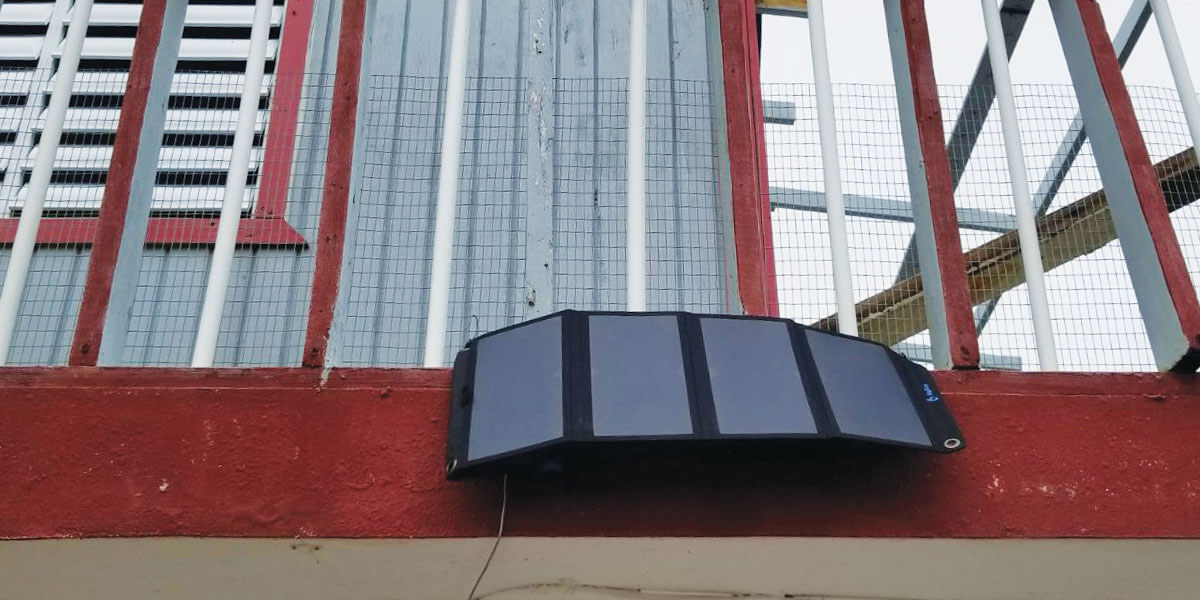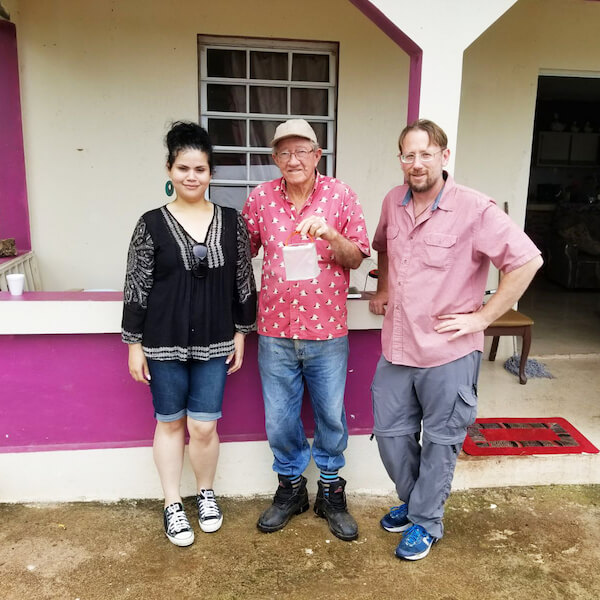
USC Viterbi alumnus PJ Wilson hopes to distribute more than 50,000 small solar kits in Puerto Rico, which still suffers from hurricane-related blackouts and other energy problems. (Photo/Courtesy of PJ Wilson)
After more than a decade at Renew Missouri, a renewable energy advocacy group, PJ Wilson, B.S. CE ’01, started to feel burned out.
As much as he enjoyed his job, Wilson, 40, worried that if he didn’t make a change soon he’d end up with “gray hair, the next few decades having flown by, and retiring from clean energy advocacy without having left the great state of Missouri,” he said. So the former Peace Corps volunteer phased himself out of a job by helping to find his replacement executive director. Then he “retired” to consider the next chapter of his life.
Wilson enjoyed his break, relaxing, spending time in nature, binge watching Netflix, and reading books ranging from Ernest Cline’s “Ready Player One” to “Entrepreneurial StrengthsFinder” by Jim Clifton and Sangeeta Bharadwaj Badal. Life was good, if not a bit directionless.
Then Hurricane Maria roared through Puerto Rico in September 2017. The Category 4 hurricane knocked out power to the entire island, becoming the strongest storm to hit the U.S. territory in 89 years. Maria, which caused $90 billion in damage and claimed an estimated 4,600 lives, led Wilson to opine on Facebook: “This seems like a great opportunity for Puerto Rico to rebuild sustainably.”
Moving to Puerto Rico
Wilson, with an extensive background in solar energy, a love of Latin America born from three years in the Peace Corps and a USC Viterbi degree in civil engineering, knew just the person who could help the island move toward sustainable energy: himself.
In a matter of weeks, Wilson founded Solar for Puerto Rico, built a website for the newly minted nonprofit and raised $5,000 through the crowdsourcing site GoFundMe. In November, Wilson filled two suitcases with dozens of small solar and battery kits he bought on Amazon.com and headed to Puerto Rico.
“I’m passionate about helping the people of Puerto Rico, because this is the part of America that needs the most help right now,” Wilson said. “People are just so warm here and thankful for what we’re doing.”
Since his arrival, Wilson and volunteers working with him have distributed 750 solar kits, mainly to remote and rural parts of the island that are still without a reliable source of energy. Each kit contains a small solar panel, a battery to store energy, two lightbulbs and USB ports. The power generated can charge cellphones and power lights, fans or even small refrigerators — a godsend to people relying on candles for light and even car batteries for electricity. They teach residents how to use the kits, noting that they need to keep the small solar panels on roofs even during cloudy, rainy days.
To date, Wilson has raised nearly $300,000. He eventually hopes to distribute 50,000 solar kits to 10 Puerto Rican towns to ensure widespread access to solar energy. Wilson sells the kits below retail and plows the proceeds back into Solar for Puerto Rico to buy more kits.
Edwards Mother Earth Foundation, a Seattle-based family foundation dedicated to enhancing sustainability to mitigate global climate change, recently awarded Wilson’s new nonprofit an $89,000 grant. “PJ’s work is vital to the communities of Puerto Rico,” said Bruce Reed, EMEF’s operations director.
Wilson wants to do more than simply distribute solar kits.
He aims to popularize solar power in Puerto Rico, whose aging and inefficient power grid was prone to blackouts long before Maria struck. Additionally, 98 percent of the island’s energy came from expensive oil and gas imports, a real drag on the island’s economy. By contrast, Wilson said, solar offers a cleaner, cheaper and more dependable energy source.
Toward that end, Wilson recently co-founded the Puerto Rico chapter of the Solar & Energy Storage Association, a nonprofit advocacy group that aims to dramatically increase solar usage.
“I find it admirable that someone from Missouri has come to Puerto Rico to help those in need,” said Alejandro Uriarte, co-founder of the Puerto Rican advocacy group and president of New Energy, one of the biggest solar companies on the island.
Added Marty Rifkin, director and co-founder of the KMR Group Foundation: “PJ and his team have a clear mission and are hard at work delivering solar panel kits to those individuals most at need. We are happy to support his effort.”

PJ Wilson (far right) has made it his mission to bring solar power to hurricane-ravaged Puerto Rico. He’s show here with the first two recipients of the solar kits he’s distributing around the island. (Photo/Courtesy of PJ Wilson)
Helping those in need
Wilson has long made it his mission to help those in need
In college, the then-president of the civil engineering honor society Chi Epsilon brought together about 50 student volunteers from USC Viterbi, the USC School of Architecture and the Greek system to build houses for Habitat for Humanity on 10 consecutive Saturdays. Wilson oversaw the bus transportation logistics and even landed a small university grant to help defray costs.
A few years later, Wilson joined the Peace Corps and moved to Olanchito, Honduras. There, he put the engineering skills he developed at USC Viterbi to good use. For a year and a half, Wilson helped oversee the design and construction of a small water system that brought the local population clean, sterilized drinking water.
“In the Peace Corps, I developed a skill set and the confidence to tackle whatever problem I saw in front of me,” he said. “That experience prepared me for the rest of my career.”
Returning home to Missouri to live near his family, Wilson transitioned into sustainable energy, co-founding Renew Missouri in 2005 and spending 12 productive years there. Through his group’s efforts, Missouri passed a ballot initiative in 2008 requiring the state’s largest utilities to receive 15 percent of their energy from renewables by 2021, including 2 percent from solar.
Wilson said he plans to spend at least five years in Puerto Rico helping to turn the island greener.
“This might sound silly, but I want to be an inspirational figure,” Wilson said. “I want people to one day say, ‘Some random farm boy in Missouri could accomplish all this? Maybe I can, too.’”
Published on August 6th, 2018
Last updated on August 6th, 2018







